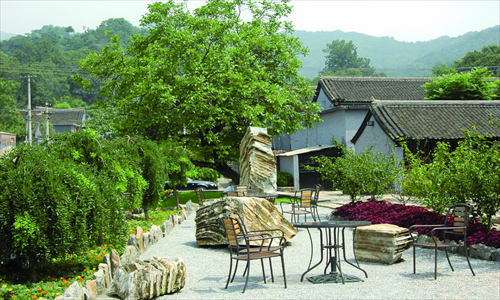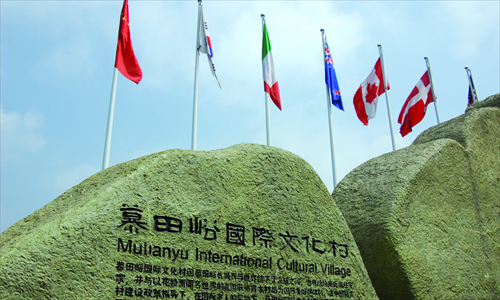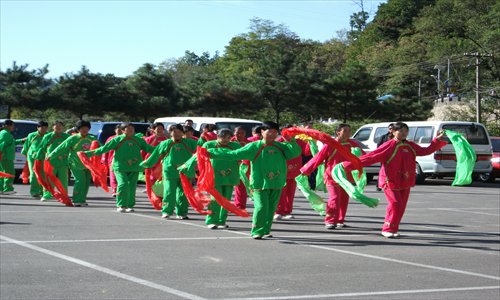Tearing down walls




Autumn is approaching and with that, the weather is cooling down. As a result, Beijingers are putting on their boots and going for hikes. At this time of year, Mutianyu Great Wall, an important section of the Great Wall located in Huairou district, becomes a hotspot, as do those sites surrounding it.
Worthy of a visit is Mutianyu village, the gateway to the wall. The village has 405 residents at present, including 22 foreign families from nine countries and regions. Dozens of Chinese farmhouses neatly line a winding paved road, forming the village's main path.
In the past Mutianyu village was a traditional enclosed community. Most villagers made a living through farm work. This changed in 1986 when the Mutianyu Great Wall, which was once part of the unprotected wild Great Wall, was repaired and opened to the public. Since then tourism has become an important industry for local people.
Profiting from a raised profile
Li Lianting, the village committee secretary, told Metro Beijing that when tourism began to blossom, many villagers became rich and moved their homes to Huairou district, which left many houses in the village unoccupied.
To make use of idle resources, Li decided to bring in outside capital to boost the local economy.
When James Spear, an American citizen, settled down in Mutianyu and became a permanent resident, Li talked to him about investment.
"When I lived full-time in Mutianyu in 2005, Li came to me and explained that there were many problems in the village. People were getting old and young people didn't have jobs and they wanted my help. So he wanted me to invest here for economic development," said Spear.
Indeed, Mutianyu had - and still has - a large number of elderly. People above 80 years old occupy nearly 6 percent of the total population. These people, according to Spear, tend to live with their children, leading to more empty houses.
Therefore, Spear began his career in Mutianyu by renting these houses out to restaurant owners and hotels, as well as managing residential properties.
Li said that after Spear did business here, more and more foreigners came to Mutianyu either for business or for leisure.
Kalle Grude, 66, and Tove Pedersen, 67, a couple from Norway, stayed in the village for nearly a month when Pedersen hosted her embroidery exhibition there. They told Metro Beijing that the village was a good place to rest.
Li said that the village treats both the foreigners and local citizens the same. But foreign residents are exempt from paying water fees in the same vein as local citizens are and the government labels each foreigner an "honorable villager."
Farmhouse feast
The tie between Spear and Mutianyu dates back 18 years, when he purchased a house in Mutianyu through a local farmer.
Spear said at first he treated the house as a weekend home, but in 2005 he decided to quit his job and moved from the city to the village.
"At that time, I was turning 50 and had a mid-life crisis. Tired of working in big business and having a high pressured life, I decided to quit my job and live full-time in Mutianyu."
After talking with Li, he rented an old primary school and rebuilt it into a restaurant called The Schoolhouse in 2006.
His courage brought him market success. According to Spear, his company is always expanding and the revenue has grown 30 percent over the last year.
Yet as an outsider, he still needs to learn how to deal with local people.
"Every day I encounter a lot of problems. As an outsider coming in to the village, it is very natural to have different views and frictions. I have learned a lot over the years about the customs, the superstitions and the preferences of the people who are living here," said Spear.
Li said at first the local villagers were not so willing to have foreigners come, but now things are different. People will say hello when they meet foreigners in the street.
According to Li, when villagers are not busy, they invite foreigners to teach people English and business knowledge to consolidate the relationship.
Now the combination of East meets West has become a unique attraction.
Grace Jose, 54, from the Philippines and Marie, 71, from Germany, who declined to give her full name, both dined at The Schoolhouse recently. They said they really enjoyed having a coffee while sitting in a typical Chinese farmhouse.
Less change for locals
Spear is not the only foreign presence in the village now. Subway, the Western fast food sandwich chain, is run by a 41-year old American citizen called Marc Helmaw. There is also a Western pizza restaurant that a local citizen, Stan Li, runs.
These dining places once only really attracted foreigners, but now see a steady stream of locals.
According to Spear, five years ago when he started the business, only 8 percent of customers were Chinese. This year the figure has risen to 45 percent.
However, although the village is attracting more enterprise, the general situation for local citizens remains unchanged.
Liu Zhizhong, 62, told Metro Beijing that he lives a life which barely has any connection to foreigners.
"We have a different kind of lifestyle. In terms of eating habits, it is impossible for us to sit at one table. The connections we maintain with foreigners are limited to just saying hello and giving a smile," said Liu.
In fact, most local citizens are still dependent on picking chestnuts, farm work and selling souvenirs near the Great Wall to make a living. Though some villagers have tried hard to run businesses like hostels, they rarely see rewards.
Xing Guangzhen, 81, who helped to take care of her son's courtyard when he was busy, told Metro Beijing that picking chestnuts and running stalls are the major incomes for the family.
Her son turned the courtyard into a hostel with five rooms, but is not successful and the market remains quite bleak.
"Few people come to stay here and the tourists are not willing to taste our cooking," said Xing. She added that the stalls near the wall are quite lucrative.
Liu Zhizhong, 62, who has worked in a grocery shop in the village for more than 20 years, told Metro Beijing that his business is still mainly for locals and foreign customers are quite rare.